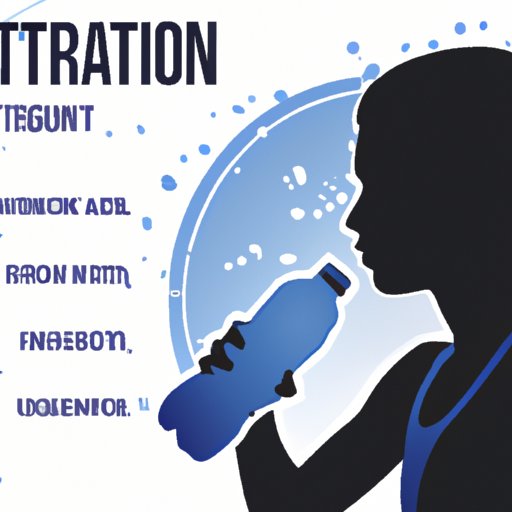Introduction
Dehydration occurs when your body doesn’t have enough water or fluids to carry out its normal functions. This can be caused by factors such as intense exercise, illness, and not drinking enough liquids. It’s important to understand the effects of dehydration so you can take steps to prevent it.
According to the World Health Organization, “Dehydration is a condition that results when the loss of body fluids, mostly water, exceeds the amount that is taken in.” When this happens, your body is unable to perform at its best, and you may experience physical symptoms such as headaches, dizziness, fatigue, and confusion.

The Dangers of Dehydration for Athletes
Dehydration can have serious consequences for athletes. According to a study published in the British Journal of Sports Medicine, “even mild dehydration of 1–2% body mass loss can significantly impair exercise performance.” This means that even if you don’t feel thirsty, you may still be putting yourself at risk of impaired performance due to dehydration.
In addition, dehydration can also lead to more serious health complications, such as heat exhaustion and heat stroke. According to a study published in the International Journal of Sports Medicine, “heat-related illnesses are the most common medical emergency encountered by athletes.” Therefore, it’s important for athletes to take steps to stay properly hydrated.
Explaining How to Stay Hydrated
There are several ways to stay hydrated. The most obvious way is to drink plenty of water throughout the day. However, sports drinks can also be beneficial in replenishing electrolytes and providing energy. Additionally, eating foods that have high water content, such as fruits and vegetables, can help you stay hydrated.
For athletes, it’s important to stay ahead of the game and plan ahead. According to Dr. Robert Glatter, an emergency physician at Lenox Hill Hospital in New York City, “Athletes should plan ahead and make sure they’re drinking fluids before, during, and after exercise to prevent dehydration.” He further recommends drinking 16–20 ounces of fluid two hours before exercise, and 8–10 ounces every 15 minutes during exercise.

Examining the Benefits of Staying Hydrated
Staying hydrated has numerous health benefits. According to the Mayo Clinic, proper hydration can help you maintain healthy blood pressure and reduce your risk of kidney stones. Additionally, staying hydrated can help improve your athletic performance. A study published in the International Journal of Sport Nutrition and Exercise Metabolism found that “proper hydration can improve strength, endurance, and reaction time.”

Investigating the Effects of Dehydration on Mental Health
In addition to physical symptoms, dehydration can also have psychological effects. A study published in the journal Appetite found that dehydration can lead to mood changes, including increased levels of anxiety and irritability. Furthermore, dehydration can also lead to cognitive deficits, such as decreased memory and concentration.
Fortunately, there are strategies to reduce the psychological effects of dehydration. For example, the American Psychological Association recommends drinking plenty of fluids throughout the day, avoiding caffeine and alcohol, and engaging in relaxation techniques such as yoga and meditation.
Conclusion
Dehydration can have serious physical and psychological effects on athletes. It’s important to understand the risks of dehydration and take steps to stay properly hydrated. This includes drinking plenty of water and other fluids, eating foods with high water content, and avoiding caffeinated and alcoholic beverages. By taking these steps, you can reap the numerous health benefits of proper hydration, and reduce your risk of impaired performance and mental health issues.
(Note: Is this article not meeting your expectations? Do you have knowledge or insights to share? Unlock new opportunities and expand your reach by joining our authors team. Click Registration to join us and share your expertise with our readers.)
